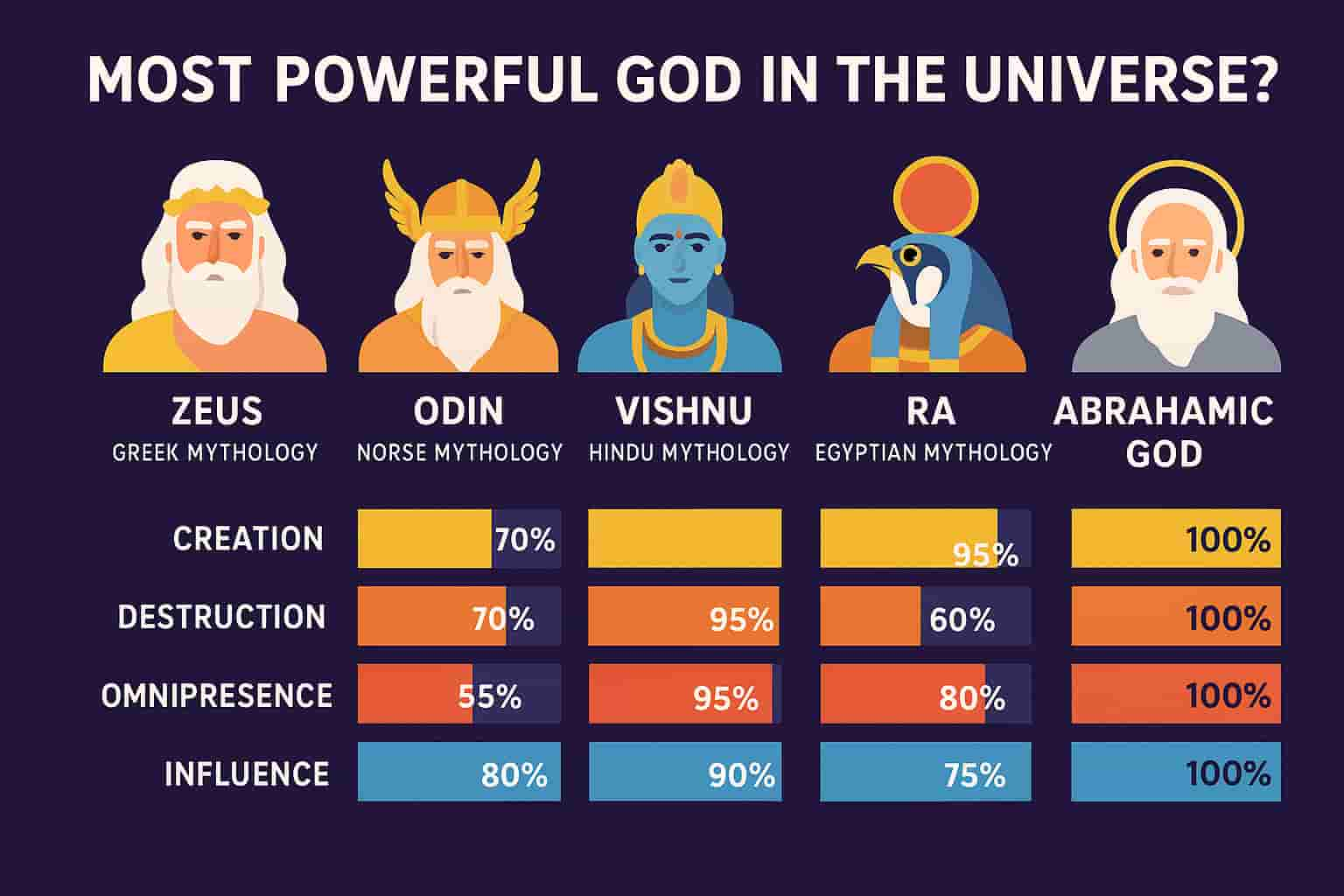
Most Powerful God in the Universe | Comparing Gods Across Mythologies
Throughout human history, civilizations have created gods and deities to explain the mysteries of the universe. From creation to destruction, each culture attributes immense powers to these divine beings. But among the pantheon of global gods, who truly qualifies as the most powerful god in the universe? Let’s explore, compare, and conclude.
1. Understanding "Power" in Divinity
Before diving into comparisons, it’s important to define what "power" means in a divine context. Scholars often consider these aspects:
-
Creation Power – Ability to create life, worlds, or the universe itself.
-
Destruction Power – Ability to destroy planets, life, or even dimensions.
-
Omnipresence – Being everywhere at once.
-
Immortality & Invincibility – Never dying or being defeated.
-
Influence Over Reality – Ability to manipulate time, matter, and fate.
With these criteria in mind, let’s examine some of the world’s most revered gods.
2. Zeus (Greek Mythology)
-
Domain: Sky, thunder, and king of gods.
-
Powers: Controls weather, lightning, and maintains cosmic order.
-
Strengths: Supreme authority among Greek gods, able to command armies of deities.
-
Limitations: Mortality constraints in myths; sometimes outwitted by other gods.
Zeus is mighty but largely bound to Olympus and his influence is mostly Earth and human affairs.
3. Odin (Norse Mythology)
-
Domain: Wisdom, war, and death.
-
Powers: Omniscient to a degree (through sacrifice of his eye), controls magic and fate, guides souls to Valhalla.
-
Strengths: Master strategist, magical knowledge surpassing other gods.
-
Limitations: Even Odin is fated to die during Ragnarok.
Odin’s intelligence and foresight make him formidable, but prophecy limits his ultimate dominance.
4. Vishnu and Shiva (Hindu Mythology)
-
Domain: Vishnu – Preservation; Shiva – Destruction and transformation.
-
Powers:
-
Vishnu: Maintains balance in the universe, incarnates in avatars like Krishna and Rama to protect dharma.
-
Shiva: Destroys evil, creates new life, controls time, and possesses cosmic energy (like Tandava).
-
-
Strengths: Near-omnipotent, omnipresent, and timeless.
-
Limitations: Rarely limited; Hindu cosmology suggests even gods follow cycles but are eternal.
Hindu deities, especially the Trimurti (Brahma, Vishnu, Shiva), exhibit powers encompassing creation, preservation, and destruction, arguably covering all dimensions of power.
5. Ra (Egyptian Mythology)
-
Domain: Sun and creation.
-
Powers: Creates life, travels across the sky, and battles chaos (like Apophis).
-
Strengths: Eternal life, embodies the life-giving force of the sun.
-
Limitations: Needs protection against chaos; power is tied to cosmic cycles.
Ra’s power is immense but largely tied to symbolic cycles of day and night rather than multidimensional control.
6. The Judeo-Christian God (Abrahamic Tradition)
-
Domain: Creation of the universe, omnipotence, omniscience.
-
Powers: Creates ex nihilo (from nothing), controls time, space, and existence itself.
-
Strengths: Absolute authority, omnipresent, beyond any limitation or rival.
-
Limitations: Conceptually none; power is infinite and unparalleled.
From a monotheistic perspective, God’s power is unmatched because it’s infinite, encompassing creation, judgment, and maintenance of all existence.
7. Comparative Analysis
| God/Deity | Creation | Destruction | Omnipresence | Influence | Limitations |
|---|---|---|---|---|---|
| Zeus | Moderate | High (via lightning) | Limited | Human affairs | Can be overpowered by fate |
| Odin | Limited | High | Limited | Strategy, magic | Fated to die |
| Vishnu & Shiva | Very High | Very High | Eternal | Universe balance | Few, cyclical limitations |
| Ra | High | Moderate | Cosmic cycles | Life & light | Needs to battle chaos |
| Abrahamic God | Infinite | Infinite | Infinite | All existence | None |
8. Conclusion: Who is the Most Powerful?
While Greek, Norse, Hindu, and Egyptian gods demonstrate immense strength, strategy, and control over natural forces, the Abrahamic God stands out as the most powerful deity in the universe based on the criteria of omnipotence, omnipresence, and lack of limitations.
However, if we look from a mythological perspective with cyclical universes, Shiva and Vishnu arguably share a unique position, as they encompass creation, preservation, and destruction within eternal cosmic cycles, making them extremely versatile in their power.
Ultimately, "most powerful" can be subjective—either absolute infinite power (Abrahamic God) or dynamic, universe-spanning influence (Hindu deities). Both interpretations highlight the awe-inspiring creativity of human imagination in depicting divine power.
🔮 Final Thought
Power is relative and multidimensional. While some gods rule thunder, others govern fate, and some control entire universes. Across cultures, the pursuit to understand power reflects humanity’s eternal curiosity about existence itself.


